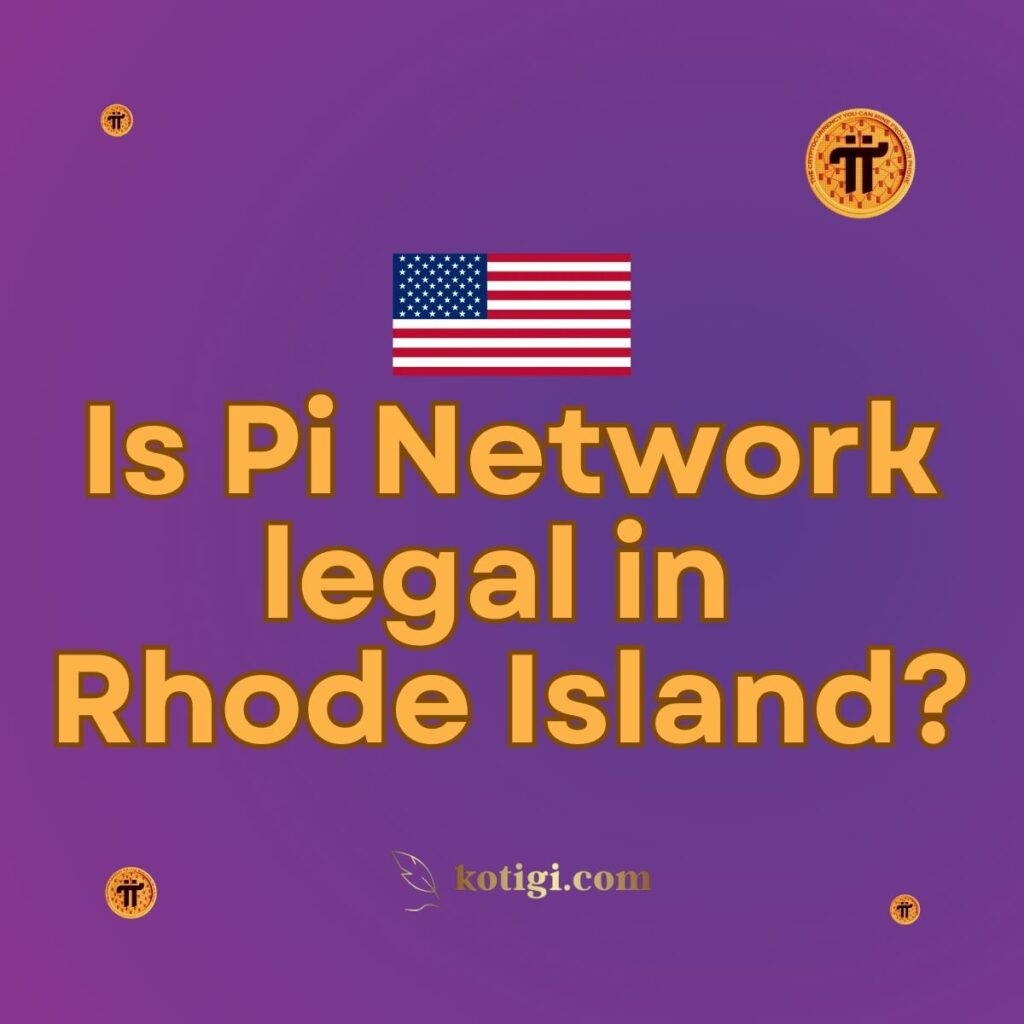
Is Pi Network legal in Rhode Island?
Yes, Pi Network is legal in Rhode Island, with no specific state regulations currently prohibiting its use. However, Rhode Island residents must comply with federal cryptocurrency guidelines to ensure their activities with Pi Network remain within legal bounds.
Introduction
As cryptocurrencies grow in popularity, understanding their legal framework becomes essential. For Rhode Island residents interested in Pi Network—a mobile mining app—it’s important to know how state and federal regulations apply to its use. This article explores Pi Network’s legality in Rhode Island, federal regulations impacting local users, compliance recommendations, and potential economic and environmental impacts.
Legal Status of Pi Network in Rhode Island
Rhode Island’s Stance on Cryptocurrency Regulations
Rhode Island has not implemented specific laws to regulate Pi Network or other cryptocurrencies. This hands-off approach allows residents to engage with Pi Network without state-imposed restrictions, provided they follow federal guidelines.
Federal Oversight and Its Implications for Rhode Island Users
The primary regulatory oversight for digital assets like Pi Network in Rhode Island comes from federal bodies, including the Securities and Exchange Commission (SEC) and the Internal Revenue Service (IRS). Understanding these agencies’ guidelines helps residents remain compliant while engaging with Pi Network.
Prospective State-Level Changes in Cryptocurrency Laws
While Rhode Island hasn’t introduced specific crypto legislation, the state may implement regulations as digital currencies gain broader use. Such potential changes might focus on consumer protection and market stability.
Federal Regulations Impacting Pi Network Users in Rhode Island
SEC’s Position on Pi Tokens
Currently, Pi tokens are not tradable, so the SEC does not classify them as securities. However, if Pi Network’s tokens become exchangeable for monetary value, this classification could change, affecting users in Rhode Island who must then follow additional regulations.
IRS Tax Requirements on Digital Assets
The IRS considers cryptocurrencies as property, which applies to how they are taxed. As Pi tokens currently lack market value, Rhode Island users face no tax obligations. If Pi tokens gain value, they may be subject to property tax under IRS guidelines.
Consumer Financial Protection Bureau (CFPB) Guidelines for Safe Crypto Use
To protect digital asset users, the CFPB emphasizes best practices like enabling two-factor authentication and avoiding phishing attempts. Rhode Island users of Pi Network can adopt these recommendations to enhance their account security and compliance.
Economic Potential for Pi Network in Rhode Island
Opportunities for Local Businesses to Accept Pi
If Pi tokens gain value, Rhode Island’s local businesses may consider accepting Pi as a form of payment, adding a digital currency option for consumers. This shift could benefit small businesses by appealing to tech-savvy consumers interested in blockchain technology.
Job Creation and Tech Development
Rhode Island’s growing tech sector might see increased demand for blockchain development and cryptocurrency expertise as Pi Network and similar platforms expand. This shift could create new job opportunities in blockchain technology and financial services within the state.
Potential Financial Integration with Local Banks
As Pi Network grows, Rhode Island’s financial institutions may explore incorporating Pi into their digital services. This integration could offer residents new options for managing digital assets within a regulated financial framework.
Security and Privacy Considerations for Rhode Island Users
Consumer Protection Laws in Rhode Island
Rhode Island’s general consumer protection laws help protect residents against fraud, even in the digital currency space. Pi Network users should exercise caution, avoiding suspicious platforms or scams, as these laws provide legal recourse if issues arise.
Cybersecurity Tips for Protecting Pi Network Accounts
Rhode Island residents can benefit from following cybersecurity guidelines, including unique passwords, two-factor authentication, and avoidance of unknown links. These practices are especially useful for Pi Network users to maintain a secure account.
Avoiding Unofficial Platforms and Scams
Because Rhode Island has no specific cryptocurrency regulations, users should only engage with the official Pi Network app to avoid potential scams. Verifying the authenticity of any Pi Network resources helps maintain a safe user experience.
Compliance for Rhode Island Pi Network Users
Federal AML and KYC Compliance
Federal anti-money laundering (AML) and know-your-customer (KYC) requirements apply to digital asset users, including those in Rhode Island. By adhering to these standards, Pi Network users contribute to secure digital currency practices and help prevent illegal activity.
Monitoring Potential Future Compliance Requirements
As digital currencies become more popular, Rhode Island may consider additional compliance requirements for cryptocurrency users. Staying informed on potential state and federal changes will help Pi Network users maintain legal compliance in the future.
Recommended Security Practices for Compliance
Following Pi Network’s security protocols—such as account verification and regular updates—will help Rhode Island residents stay compliant with future requirements, should new regulations be implemented.
Educational Resources on Pi Network and Blockchain in Rhode Island
University Courses on Blockchain Technology
Institutions like Brown University and University of Rhode Island offer courses that provide foundational knowledge of blockchain technology and cryptocurrency, aiding Pi Network users in understanding blockchain fundamentals.
Blockchain Conferences and Events in Rhode Island
Local blockchain events and conferences provide valuable opportunities for learning and networking. Rhode Island residents can attend these events to stay informed on industry trends and best practices, gaining insights beneficial for managing Pi Network effectively.
Online Resources for Digital Asset Education
For users who prefer self-paced learning, online resources and official Pi Network channels offer tutorials, updates, and guides. These resources help Rhode Island residents keep up with the latest information on Pi Network and secure participation.
Environmental Impact of Pi Network in Rhode Island
Low-Energy Mining and Pi Network’s Sustainability
Pi Network’s mobile mining uses minimal energy, aligning with Rhode Island’s environmental goals by offering a sustainable cryptocurrency option. This energy-efficient model is an appealing choice for eco-conscious residents interested in digital assets.
Contribution to Rhode Island’s Sustainability Goals
Rhode Island’s commitment to sustainability aligns with Pi Network’s low-energy mining model, which could contribute to the state’s carbon reduction efforts if adopted widely.
Potential for Eco-Friendly Blockchain Innovation
Rhode Island’s emphasis on environmental responsibility may inspire further eco-friendly developments in blockchain technology. Pi Network’s model sets an example of how blockchain can operate with lower energy consumption, which is beneficial for the state’s green initiatives.
Privacy Considerations for Rhode Island Residents
Digital Privacy and Data Protection Laws
Rhode Island enforces data privacy laws that protect residents from unauthorized data sharing, helping secure Pi Network user information. Rhode Island users should follow best practices, including safeguarding personal data and using strong passwords.
Account Security Tips for Rhode Island Pi Network Users
Enabling security measures like two-factor authentication and keeping personal data private can significantly enhance Pi Network account security. Rhode Island residents are encouraged to adopt these measures to protect their digital assets.
Best Practices for Responsible Pi Network Use
Rhode Island residents should update their Pi Network app regularly, follow Pi’s security guidelines, and remain cautious about sharing sensitive information. These practices ensure a secure experience with Pi Network and align with state privacy recommendations.
Potential for Future Developments in Rhode Island Cryptocurrency Regulations
Trends in State-Level Cryptocurrency Regulation
While Rhode Island currently lacks specific cryptocurrency legislation, the rise of digital assets may prompt the state to explore additional policies to support a safe and regulated environment for crypto users.
Impact of Regulatory Changes on Pi Network in Rhode Island
Future regulatory changes could directly impact Pi Network’s operation in Rhode Island, potentially involving licensing, tax requirements, or additional security measures. Staying informed about these changes helps users remain compliant.
Preparing for Regulatory Shifts
Rhode Island Pi Network users can stay ahead by monitoring both state and federal regulatory changes, ensuring they are ready to adapt to new compliance requirements and continue secure participation in Pi Network.
Conclusion
Pi Network is legal for Rhode Island residents, who may engage in mobile mining and digital asset use without state-specific restrictions. However, residents must remain aware of federal regulations, including tax considerations and securities guidelines, to ensure compliance as Pi Network evolves. With an environmentally friendly model and potential economic benefits, Pi Network presents a promising digital asset option for Rhode Island users.
Key Takeaways
- Current Legality: Pi Network is legal in Rhode Island with no state-specific restrictions.
- Federal Regulations: Users should follow federal guidelines from agencies like the IRS and SEC.
- Economic Opportunities: If Pi tokens become valuable, Rhode Island businesses may accept Pi as a payment method.
- Environmental Impact: Pi Network’s low-energy model aligns with Rhode Island’s sustainability efforts.
- Educational Resources: Rhode Island universities and local events offer blockchain education for Pi users.
- Security Practices: Residents should enable two-factor authentication and follow secure digital practices.





